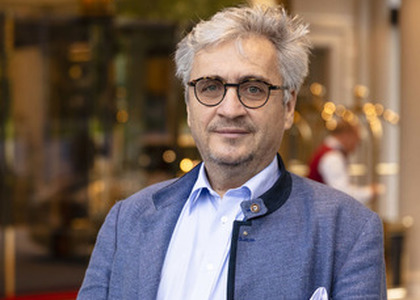> [Archived] Interviews

Interview with Drazen Domjanic about the ICMA Discovery Award
The Manager and Artistic Director of the Liechtenstein Music Academy, DrazenDomjanic, is also the initiator of the ICMA "Discovery" Award.
How did the idea for the ICMA "Discovery" Award came about?
I must say that the Liechtenstein Music Academy is successful withyoungsters, soseveral years ago we talked about an award specifically dedicated to young people.We can nominate three people under the age of eighteen for this award, and the jury, made up of 70 publications and organizations dedicated to classical music, decides who is the best. That's how the idea for the ICMA "Discovery" Award came about.
Given that you are the artistic director and manager of the Liechtenstein Music Academy, I would like to hear from you about the new building you have inaugurated.
The Academy is fifteen years old, in 2010 we started to collaborate with real talents who have a good chance to enter the music market after their studies.We start with nine-year-olds and reach people up to 30 years old studying here at the Academy. So far we've only had instrumental performance and chamber music, but in the future we want to make more modules, for example for musical performance with improvisation, for competitions, for public music education... we also want an entrepreneurship module, in which we can talk about taxes, finances, and we would also like to address mental health...We want to work on the careers of teenagers, and for these ideas we needed a new building.We have the necessary funds for the Hagenhaus building, which will be ready in June of this year. We are very happy to have this building, where there will be a concert hall with about 160 seats, with new instruments, with means of recording (both audio and video), we will have the necessary space to teach all the modules that I had mentioned earlier.
You also had Romanian students at the Liechtenstein Music Academy.
Romanian students like Andrei Gologan, who was studying in Salzburg at the time, or Kira Frolu, who was invited here four times last year... People apply and when we see a good video recording, accompanied by a good biography, we keep in touch with them and they come here.
How would you describe today's young generation?
The young musicians of today's age are much better than the ones from 20 years ago. The quality is incredibly high. But I constantly ask myself: who has a chance today, in the market, to be only a soloist? And the answer to this question is a difficult one.We try to help youngsters in this way. For example, I had a concert last month with a cello octet. In the first cello octet, 20 years ago, musicians such as Luka ©uliæ, from the band "Two Cellos" played; in the second octet, we had Kian Soltani, but also Andrei Ioniță - also from Romania, he was here at the Academy, where he met for the first time Professor Jens Peter Maintz, with whom he later studied - so we had this second byte, of a very high quality.And now we have a third one with PetarPejèiæ, winner of the "Queen Elizabeth" Competition in 2022 - the quality is now higher.In 20 years we have had three cello octets here, and the quality has been higher each time. And the same is true for the piano or the violin.
Translated by Alina-Cristina GoșmanUniversity of Bucharest, Faculty of Foreign Languages and Literatures, MTTLC, year I
Corrected by Silvia Petrescu














